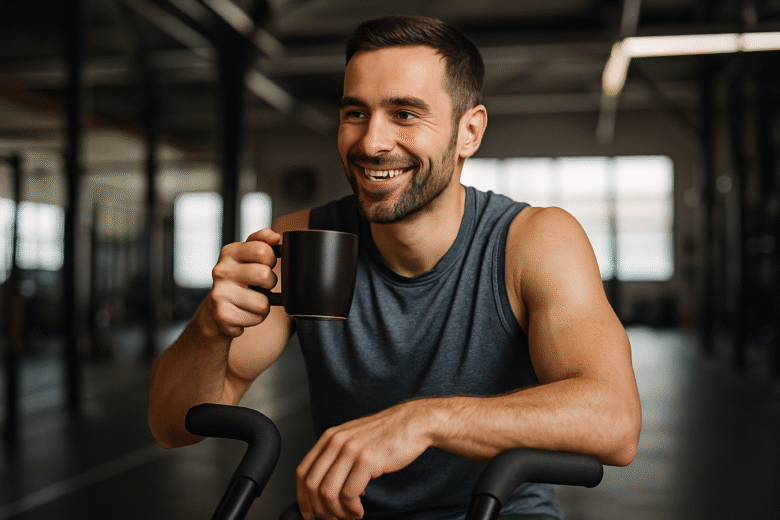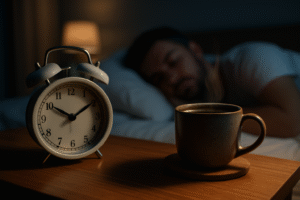Coffee isn’t just for sleepy mornings or work breaks—it can also play a valuable role in your fitness routine.
Many athletes and casual exercisers turn to a cup of coffee before hitting the gym, running, or doing yoga. But is this practice truly beneficial? What does science say about using coffee to enhance exercise performance?
In this article, we’ll explore how coffee affects physical activity, whether it improves strength and endurance, how to time your intake, and who should be cautious.
Whether you’re training hard or just trying to move more, understanding coffee’s role in exercise can help you optimize both energy and results.
How Coffee Supports Physical Performance
The primary active compound in coffee is caffeine, a natural stimulant that affects the central nervous system. When consumed before exercise, caffeine can help:
- Increase alertness and reaction time
- Delay the onset of fatigue
- Improve endurance by mobilizing fat stores for fuel
- Enhance muscular contraction and power output
- Boost motivation and mental focus during workouts
These benefits make coffee a natural ergogenic aid, meaning it helps the body perform better without the need for artificial supplements.
Caffeine and Endurance
Several studies have shown that caffeine can improve aerobic performance, especially in endurance activities like running, cycling, and swimming.
Caffeine helps the body use fat for energy, which conserves glycogen (stored carbohydrates in muscles). This delay in glycogen depletion means you can exercise longer before hitting fatigue.
Even moderate doses—around 3 to 6 mg of caffeine per kilogram of body weight—have been shown to improve time to exhaustion, running speed, and perceived exertion.
Coffee and Strength Training
While caffeine’s most dramatic effects are on endurance, it also benefits resistance training.
Research suggests that caffeine can:
- Increase explosive power (like sprinting or jumping)
- Enhance muscle strength and contraction speed
- Improve focus and motivation during weightlifting
- Reduce perceived pain and muscle fatigue
This means you might feel stronger, more focused, and able to push through those last few reps more effectively when caffeine is in your system.
When to Drink Coffee Before Exercise
Timing is everything. To maximize the benefits of caffeine during your workout, aim to drink coffee 30 to 60 minutes before exercising.
This gives your body enough time to absorb and activate the stimulant. It also reduces the risk of digestive upset during movement.
Stick to black coffee or coffee with minimal additives—avoid high-sugar or heavy cream drinks before exercise, as they can cause sluggishness or nausea.
How Much Coffee for a Workout Boost?
The ideal amount of caffeine for exercise performance is generally:
- 3 to 6 mg per kg of body weight
- For a 70 kg (155 lb) person, this equals 210–420 mg of caffeine
- That’s about 2 to 4 cups of brewed coffee, depending on strength
However, sensitivity to caffeine varies. Start with a lower dose (1 cup) to assess your tolerance. More is not always better—excess caffeine can lead to:
- Jitters
- Elevated heart rate
- Dehydration
- Anxiety
- Energy crashes post-workout
Coffee vs. Pre-Workout Supplements
Many commercial pre-workout formulas use caffeine as a primary ingredient—but often in high concentrations (200–400 mg per scoop), combined with stimulants, artificial flavors, and sweeteners.
Coffee offers a more natural, familiar source of caffeine, along with antioxidants and polyphenols that may support cellular health.
While some pre-workouts include added amino acids or vitamins, coffee provides a clean energy boost without synthetic ingredients—making it a preferred choice for those seeking a more whole-food-based approach.
Does Coffee Help With Recovery?
Caffeine’s benefits don’t stop at performance. It may also aid in post-workout recovery, especially when consumed alongside carbohydrates.
Studies have shown that caffeine can:
- Speed up muscle glycogen replenishment
- Reduce delayed onset muscle soreness (DOMS)
- Improve mental alertness after exercise
A post-workout coffee paired with a balanced meal (containing carbs and protein) can help the body recover faster—especially after long or intense sessions.
Just be sure to hydrate properly as well. Caffeine is mildly diuretic, and replacing fluids is essential after sweating.
Morning vs. Afternoon Workouts: What’s Best for Coffee?
Morning workouts: Coffee is especially useful for early exercisers who need a mental and physical wake-up call. It boosts alertness and body temperature, helping you shake off sleep and move with more energy.
Afternoon workouts: Be cautious with caffeine later in the day. If your session is after 4 PM, coffee might interfere with your sleep. Opt for smaller doses or switch to low-caffeine options like tea or half-caff.
Who Should Be Cautious With Coffee Before Exercise?
While many people benefit from pre-workout coffee, it’s not for everyone.
You may want to skip or limit coffee before exercise if you:
- Have high blood pressure or heart sensitivity
- Experience acid reflux or digestive discomfort
- Are pregnant or breastfeeding (consult a doctor)
- Are prone to anxiety or panic
- Already consume large amounts of caffeine daily
In these cases, consider decaf, herbal teas, or non-caffeinated pre-workout routines like deep breathing, hydration, or dynamic stretching.
Coffee and Hydration During Workouts
Contrary to old beliefs, moderate coffee intake does not significantly dehydrate most people. But it’s still important to drink water before, during, and after exercise.
Tips:
- Drink a glass of water with your coffee
- Bring a water bottle to your workout
- Replenish electrolytes if you sweat heavily
Staying hydrated ensures that your performance and recovery aren’t compromised.
Building a Coffee + Workout Routine
Here’s how to build a sustainable routine that combines coffee and fitness:
Before workout:
- Drink 1–2 cups of coffee 30–45 minutes before exercising
- Pair it with a small snack if needed (like a banana or energy bar)
During workout:
- Sip water regularly
- Avoid extra caffeine during short sessions
After workout:
- Cool down and stretch
- Eat a balanced meal (carbs + protein)
- Optionally enjoy a second small coffee (if early in the day)
Use your body’s feedback to refine the approach over time.
Final Thoughts: Coffee as a Fitness Ally
Coffee can be more than your morning ritual—it can be your fitness partner, boosting energy, endurance, strength, and focus when used intentionally.
By understanding how caffeine works in your body and adjusting the dose and timing to suit your needs, you can use coffee to get more out of every workout—without overdoing it.
Whether you’re hitting the gym, going for a jog, or doing yoga at sunrise, your cup of coffee may be the natural fuel that powers you forward.

Marcio Luzardo is a coffee enthusiast and the voice behind Tudo Viraliza. With a passion for turning curiosity into practical knowledge, he shares easy-to-follow tips, guides, and insights to help readers enjoy better coffee every day. When he’s not writing, Marcio is exploring new brewing methods or diving into the rich stories that connect coffee to culture, lifestyle, and wellness.



